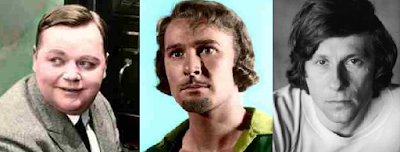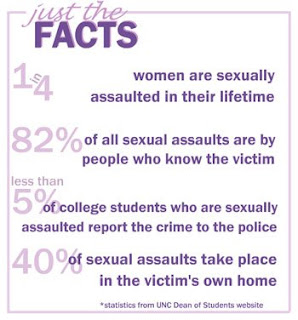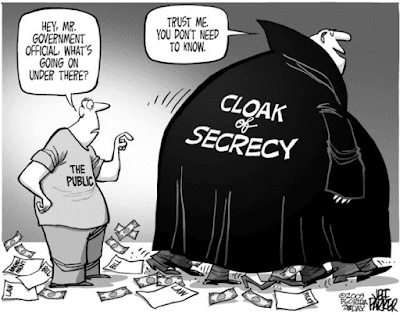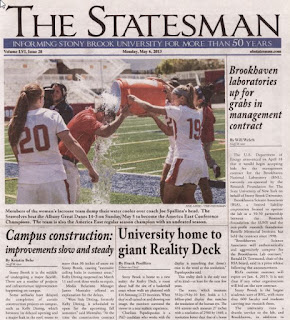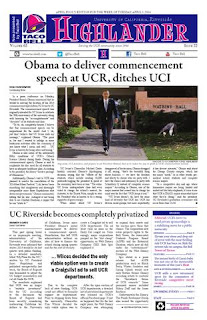MCOM 4003 - Suzanne Lanoue
Suzanne's Blog for her class - Mass Communication 4003: Media Law and Ethics (for the Mass Communications Degree at Southern Arkansas University)
Tuesday, May 1, 2018
Final Project: Hollywood Lies
Everyone lies at some point in his/her life. Some of us lie more than others. Some of us (like me!) are not good at lying. However, people in some professions seem to lie more than others. Lawyers often lie, or counsel their clients to lie (with the boundaries of the law). Celebrities and their agents often lie as well. Here are the reasons celebrities lie: 1) to deny that they did something terrible; 2) to make themselves look better; or 3) to put a good spin on something. Others in TV and movies lie as well because they're trying to manage a bad situation, or because their lawyers told them to lie. Some of the lying is fairly harmless and may even be considered just "publicity." For instance, if a TV proclaims that their show is "The hottest new show this season," it doesn't really matter, even if that show is canceled 3 weeks later. It's just harmless hyperbole.
Actors get a reputation for lying, in part, because it's their job to lie. Acting is pretending, or lying, to a certain extent. Then they have to go on talk shows and convince people to see their movie, play or TV show, or buy their book. Sometimes they are required by contract to only be happy, smile and say nice things about their project.. Then they also have publicity people to help them with that. They're similar to salespeople in this regard. It doesn't matter if they actually believe what they're saying - whether they think their product is good or not. It only matters if you buy it. Remember that next time you see your favorite actor selling Mountain Dew, or reverse mortgages, or hawking their jewelry on QVC. They're being paid to do this; they may be lying. Their agents and managers lie, too, to get them parts, and raises, and percentages. They call it "playing the game."
Some lies do matter more than others, which is what we're seeing lately with the stories about sexual predators. These stories are happening in all walks of life, but we hear more about the ones happening in TV and movies. For decades, people in Hollywood covered up all of the rapes and sexual harassment that women faced constantly, even though we'd all heard about the "casting couch" for years. The cover-up is not working so much now. Video
I can say confidently that almost every woman in the world has faced some sort of sexual harassment (usually physical), abuse or assault. This is not something I need to even check because I know it, from talking to all of my friends over the years, and reading news stories, blogs, etc. It's just something that comes from being a woman, especially if you were around before this century. I hope that younger men are being taught not to be predators and that young women are being taught to speak up more, but I don't know if that's the case or not. This behavior is just something that we all know, just like we know that there aren't too many African Americans that haven't been bullied, harassed or assaulted by authority figures (usually multiple times). And yes, I'm deliberately being vague here.I will add, also vaguely, that I have had some of these things happen to me. I don't want to reveal too much private information here in my class blog, so I'll leave it at that. 😉 Video
Back to Hollywood. There have been "Hollywood sex scandals" dating way back to the 1920's. Usually these stories get out to the tabloids; sometimes they don't reach mainstream news, unless a case goes to trial. It's not just the people who work in TV and movies that ignore them or cover them up, but sometimes also the press or the police.
More of these incidents have been in the news recently because of several high profile cases. Partly it's because celebrity women are finally coming forth; partly it's because people are believing them more; and partly it's because of social media and traditional media. It's really a combination of all of these things.
Anyone who knows me, especially online, knows that I don't mind a good argument, especially when it's about something I believe in. However, I never argue without first looking up the facts. You just look stupid if you have an argument online without backing it up (it's surprising how many people do that, when it's so easy to look things up on Google or Wikipedia). I've had many arguments online with people on Twitter and Facebook about rape and assault, so I've done quite a bit of research about it. Here are some rape facts. Video
The people on the other side who argue with me try to claim that a lot of women make up rape charges, which just isn't true. Most don't. The FBI maintains violent crime statistics and says that only about 2% of rapes are made up. Of course, this only accounts for the rapes reported. We know that only about a third of rapes are reported. The reason for both is the same: rape victims risk a lot. Many people don't believe them or blame them, or try to shame them. The police and lawyers often are not very sympathetic and grill them about what happened (although this is changing as police departments have more officers specially trained to handle rape victims more sensitively). They have to relive what they went through, over and over. They may face threats from either their rapist or other people in their community (particularly if their rapist is someone they know). They may risk their job, their family and their reputation. Also, it's hard to prove rape in court, even if there's physical evidence. Lastly, with the backlog of cases, along with the attitudes that many police have about rape, many of the rape kits go untested, which means there is no case and no arrest. When you look at all that, it makes sense why many women don't report the assault, and why very few would make it up. If the perpetrator is a celebrity, then you have additional press coverage of the accusation, which can make it even more difficult to press charges. Video
First, let's look at the Cosby rape accusations. 60 women accused him of rape. While some people are still defending him, most realize it's pretty unlikely that 60 women are lying about this. Some of them date back to the 1960's, when he starred in "I Spy." Why didn't more of the women report that he drugged and raped them? There were many reasons. Some of them did report it to their bosses or colleagues, but they were told not to pursue it. Cosby also lied to the women and said they just had too much to drink, so some of them believed that, or they were unsure. You can be sure that most were worried that it would affect their careers. This may seem like a selfish attitude, but people are allowed to be selfish, particularly when it comes to their livelihoods. Cosby was rich, powerful and popular. He could really ruin these women's careers. Reputation meant a lot back then, too. Another reason some didn't report it was shame. Women were taught back then that if something happened to them it was because they were not being careful, or they were not acting like ladies. Cosby threatened some of the women and made promises to help others' careers. He did whatever worked, I guess. Video
Some of the women did report the assaults to the police, but the police didn't believe them. Andrea Constand, who was the main accuser in the recent case, was one that did that. Since the police wouldn't arrest him, she sued him in civil court and won $150 million. It wasn't until comedian Hannibal Buress started talking about Cosby raping women in 2014 that others in the media (especially social media) started paying attention. Many knew about Cosby's behavior for decades, but it wasn't until he started giving lectures on college campuses this century about how young black men should be acting that people in the African American community started taking umbrage at his seemingly hypocritical behavior. Someone in Buress' audience took a video of his act, and that went viral. This led to the police re-opening the case in 2015. Cosby was finally convicted on 3 counts of sexual assault, Thursday, April 26. I'm sure the victims feel vindicated, but I'm sure they also feel like justice is coming a bit late, since it took 50 or more rapes, plus over 50 years, for him to be convicted. He's in his 70's, blind, and uses a cane; his career has already been destroyed. He'll probably die in prison. Justice would have been more powerful if it had happened many years ago. Video
I'm sure I'm not the only one who grew up in the 60's and 70's that was horrified to hear that Bill Cosby is a monster. I was a big fan of his. My family listened to his comedy record albums and watched "I Spy." I went to see his movie "Uptown Saturday Night" many times when it played in our local theater one summer, and I saw all of the other movies he starred in after that. I watched all of his sitcoms (He played a high school basketball coach in the early 70's on "The Bill Cosby Show"), his "Fat Albert" cartoon, and later, his hugely successful "The Cosby Show" sitcom that aired from 84-92. I even watched the sitcom he had after that, which wasn't all that funny. I followed him on Twitter, too. It's very sad when our favorite celebrities let us down. What a shame that he wasted all of that talent, wealth and fame and chose to be evil. So many people looked up to him. His co-starring role on "I Spy" was ground-breaking for black America, and "The Cosby Show" revived the sitcom. Video
Harvey Weinstein was a powerful Hollywood producer, who co-founded the independent film company Miramax with his brother. He also produced many plays and has won many awards, including Oscars and Tonys. Over 80 women have accused him of sexual assault in the past 6 months. He had many people in Hollywood who helped him cover up his misdeeds. Actress Ashley Judd was the first to accuse him last year, and many others came forward after her brave interview with the New York Times. What made her come forward? Why is she believed, when so many others haven't been? I don't know, but clearly it was the right time, and she inspired many others to come forward. Weinstein will probably be the next one to go on trial. Inspired by Judd, actress Alyssa Milano posted "#MeToo" on Twitter (she may have gotten the idea from an African American activist, a women who had previously used "Me Too" to promote awareness of sexual assault, back in 2006) and suggested other women post it as well, to promote awareness of sexual harassment and assault. This became an international movement; it morphed into "#TimesUp" after that. Video
There have been many other accusations against famous men, and most of them are plausible. There were only a few instances, where just one person made an accusation, and their story didn't seem accurate. One man accused George Takei, and he sounded like some crazy guy. Takei has vehemently denied it, and no one else has ever accused him. A woman accused Anziz Ansari of inappropriate behavior, but from her own story, she didn't say no and voluntarily took her own clothes off, and she could have left but didn't. She sounds a bit off and like she somehow expect Ansari to read her mind. This is my opinion. Please do read the stories and make up your own mind.
Some people feel that Senator Al Franken was punished too harshly because the first woman who accused him, Leeann Tweeden, was a right-wing radio commentator, and her story didn't sound right. However, eight other women also came forward with different stories. My guess is, if more than one or two people come forward, than it probably is a real pattern. It's a shame that his previous handsy behavior tainted the good work that he did in the senate.
Perhaps Franken shouldn't have gone into politics, or perhaps he thought it would be ignored. Until fairly recently, politicians were able to get away with sexual misconduct because the press helped to cover up. One famous example is President John F. Kennedy. We know now that he had numerous affairs while he was in the White House and also sexually harassed at least one young woman, an intern. Back then, no one spoke about it, and it was not in the news. You don't have to be a fan of "Mad Men" to know that women were treated very differently back then. Many other presidents and representatives commited rape and sexual harassment, but it wasn't until Bill Clinton that a president was publicly accused of it. He probably thought that he would get away with it, too. At some point, the press decided to stop giving politicians a free pass. Watergate may have been the reason behind that.
Anyway, actors Kevin Spacey, Danny Masterson, James Franco, Dustin Hoffman, Jeremy Piven, and Jeffrey Tambor; comedian Louis CK; media/news men Charlie Rose, Tom Brokaw, Matt Lauer, Roger Ailes, and Bill O'Reilly; politicians President Donald Trump, Rep. John Conyers, Jr., former Judge Roy Moore; and many others have all been accused in the past year of rape and sexual harassment. However, most of the allegations will probably never lead to arrest, let alone trial or conviction.
It's pretty clear that women are now speaking up more, thanks to all of these actresses and others coming forward with their stories. The police are being forced to look into cases. The news media is unearthing any possible stories. Social media is constantly reminding us of the alleged crimes of these men. I hope that the progress continues, and this type of behavior is no longer accepted anywhere. I think that these eye-opening events of the 21st century are a very good step forward for women's rights.
Wednesday, April 18, 2018
Brief #10: Freedom of Information Act
It seems to me that there has always been a battle between
the people of our country, who want to know what the government is doing
(especially when it affects them), and those who work for the government, who want to do their
job in their own way, and not have to answer to the people (or anyone else) -
especially since there is a lot of bureaucracy in government that seems to
hamper getting things done. Although I have some sympathy for the government
officials, wanting to ignore the rules and just fix problems, it's we, the people
who elect the government, and who have the right, via the press, and the
Freedom of Information Act, to know what's going on behind closed doors. There are many exemptions to the Freedom of Information Act (FOIA) as well. The
Federal FOIA applies to the executive branch of the
government, but the states each have their own Freedom of Information Act. Sometimes,
it’s companies, not individuals, who are using the FOIA to get the information from
the government, such as in this Arkansas case that started last year. Video
(Take the Arkansas Freedom of Information Act Quiz!)
(Take the Arkansas Freedom of Information Act Quiz!)
An attorney named Steve Shultz has been suing the Arkansas
Department of Corrections (ADC), using the state's FOIA, to
release package inserts and labels for the three drugs used in state
executions. The ADC wants to redact theinformation that would tell exactly who was making and distributing the
drugs. Drug companies don't want their
drugs to be used for state executions; it's bad for their businesses. It's
difficult for the ADC to find sources of the
drugs. If these sources were made public, it would make it more difficult for
them to get access to them, or to find replacements for the drugs. The secrecy
provisions of the state's Methods of Execution Act permits them to redact the
information. Video
None of the articles I've read explain exactly why Shultz is suing; it could be that he has a client who wants to use the information to either sue
the state for a past execution in a wrongful death lawsuit; or he wants to prevent
the state from performing more executions.
He could also be representing the drug companies. Drug manufacturers and their distributorshave been suing ADC for years; they claim that the state obtained their drugs illegally (the companies did
not give them permission to use them for executions). In this case with Shultz, the courts keep telling the ADC to release the information, but then they appeal to higher courts. Because there are three different drugs, there are
three different lawsuits, which makes things even more complicated. Video
The latest ruling from the Arkansas Supreme Court said thatthe ADC could redact certain information fromthe labels that could identify who sold or supplied potassium chloride to the
state. They've sent it to Pulaski County Circuit Judge
Wendell Griffen, who gets to decide which information must be redacted. The court has disagreed with the ADC's assertion that the information must be kept completely secret
because they're only supposed to use FDA-approved manufacturers for their
drugs. Not knowing whose product they're using makes it impossible to tell if
they're in compliance or not. It's interesting to note that Judge Griffen is also a death penalty protester.
Wednesday, April 11, 2018
Brief #9: College Media
The phrase "college media" can mean many things, from student or university blogs, to social media posts, to the school newspaper or TV studios. I decided to focus my post on U.S. college newspapers (many of which are online-only, like our own "The Bray"). I knew very little about college newspapers, so this was an interesting fact-digging assignment for me. I worked on my junior high school paper in 9th grade, and I drew some cartoons for my school paper in Palomar Community College in 1980. I wrote some articles for The Bray last semester. I've been at many universities, due to my husband's job, and some of their papers were good, and some not so good. Other than that, I know zilch about school papers. Video
From what I've been able to tell with my online research, today's college newspapers face three main challenges: whether to keep printing or move online entirely (or to blogs and social media); how to get funding in the face of budget cuts; and facing censorship. Video
Unlike professional newspapers, school papers are usually funded by the university (via student fees), or they have advertisers, or both. These papers are always free, so they can't charge a subscription fee. Our paper here at SAU pays the students for articles and photos, which I was surprised to learn. I thought school papers were either put out by a particular journalism class, or they were run by volunteers (like a campus club), which is how papers are done in high schools and middle schools (at least, as far as I remember). On the other hand, many colleges no longer have journalism degrees or even journalism classes. Our major is "Mass Communication" and focuses on online media and PR as much as journalism. However, the writers and photographers of the school paper are not necessarily Mass Comm majors. Video
I was shocked that university papers are having financial cutbacks because I thought they were well-supported by the colleges. Apparently when colleges try to cut costs, the school paper budget is one of the things they do slash. I suppose if a school paper is not popular with the students, and not well read by others in the community, and there is no Mass Comm or Journalism degree, they shouldn't charge students extra money for it. That makes sense. Unfortunately, I think that funding is cut even when the papers have many readers.
Many school papers stopped printing an actual paper and have gone digital. Sometimes it's because of printing costs, but also it's because today's students are more comfortable with digital newspapers. Also, today's students tend to be environmentally conscious, so it makes sense that they would rather not kill more trees or have to recycle newspapers instead of having a digital paper (even if going digital is not necessarily any more ecologically-friendly.) Some college newspapers are using social media to help bring in more readers. Video
I was even more shocked to learn that some college administrators try to control what the newspaper talks about. Here at SAU, the administration has a "hands off" policy when it comes to the paper. The paper isn't even hosted on the SAU website. It's completely independent and student-run. The advisor only advises and doesn't tell the editor or reporters what to do. The first amendment is alive and well here in Southern Arkansas.
College newspapers also vary widely in their writing styles, resources and circulation numbers. Top universities like Harvard train their students in newspapers and magazines that are very similar to real-world major newspapers. Some colleges have moved their operations entirely to blogs or social media. I suppose that's the wave of the future in student newspapers. Video
Thursday, April 5, 2018
Brief #8: Investigative Journalism
Sinclair Broadcast Group started in the seventies, but now they have almost 200 news stations across the country. A loophole in the law, as well as political shenanigans, have enabled them to buy up a lot of stations. They contribute to the consolidation of the media that has been going on in the U.S. for quite awhile. According to recent news reports, they tell their reporters in these news stations exactly what to say in their editorials (which are always conservative). Americans rely on the news to be accurate, and if a news person is delivering an editorial commentary, it's expected that the commentary is their own, as a local voice of the community. It's shocking to learn that so many of these stations are just delivering whatever their bosses want them to say, without regard to journalistic integrity. This story of "must-read editorials" was in the news this week when someone put many of the stations' videos together to show just how alike they were. Although some reporters have been warning us about Sinclair for a while, it was a viral video from a sports news site Deadspin that recently brought Sinclair into the public awareness. Video

This video not only shows you the synchronized news stories, but it tells all about how Sinclair is growing, and what lies they've been telling, especially in their home city of Baltimore. It's pretty scandalous. Although it's true that newspapers, TV news stations, news networks and the like are businesses that want to make a profit, it's rare that the people in charge so obviously care more about making money and pushing their own greedy agenda than they do about the integrity of their programming.
The leftist magazine The Nation rightly points out that this is chilling - not because it's right-wing news - but because having ONE source (or few sources) for the news is bad for democracy. Their company website claims that they're "one of the largest and most diversified television broadcasting companies in the country." I don't think they understand what "diversified" really means.
The group has been accused not just of pushing a right-wing agenda, but of favoring Trump and his allies. Trump has also praised Sinclair, while he's denounced all other news sources, except for FOX news. This all goes against everything journalists believe. The reporters should be as unbiased as possible, and reporting real news, not reporting with any agenda. An editorial should not be promoting the interests of a corporation whose goal is just to make money and to have power, not to represent the community or discuss real issues. It's ironic that the editorial that drew the attention of the media was about "fake news," when that's what these editorials seem to be. Video
This article pose the hypothetical question, "What would happen if President Obama acted like Trump on Twitter, and Sinclair were a left wing news organization?" Of course, it's a silly thing to speculate because Obama would never act that way, and there really aren't any left wing news organizations. Many journalists may have liberal or progressive beliefs, but they don't let those beliefs get in the way of their journalistic goals. It would be unethical for them to do that. Video
As legendary investigative journalist Bob Woodward says about reporters who cover President Trump, "it’s important to get your personal politics out. It's destructive to become too politicized." Someone needs to teach Sinclair about these basic press ethics.
Subscribe to:
Comments (Atom)




